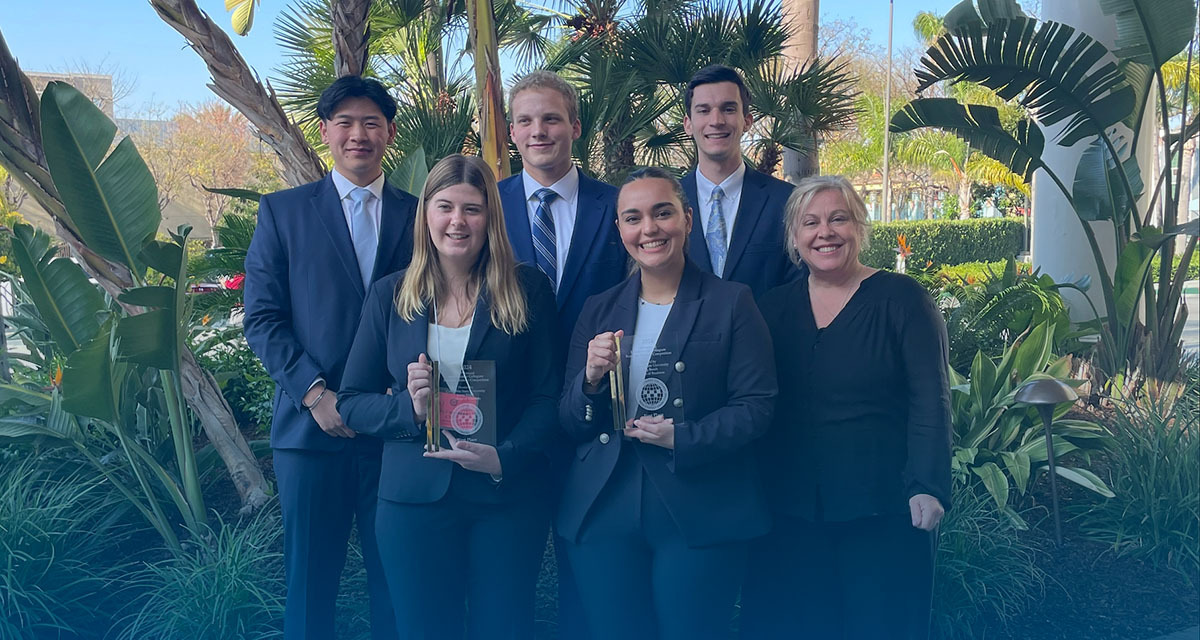Gordon Places for Second Year in a Row at International Collegiate Business Strategy Competition
Have you ever wondered what it would be like to run a business? The International Collegiate Business Strategy Competition (ICBSC) makes this scenario a reality with a business simulation that pushes students to lead and learn about a theoretical company in a realistic market game. From allotting finances and increasing productivity to writing documents and handling real-life “glitches,” students have to make detailed decisions to ensure their business thrives above all the others.
For the second year in a row, a team from Gordon’s Business Club competed at the ICBSC and had stellar results, winning awards for “Best Overall Performance” and “Best Documents in Their World.” Greg Smith, professor of marketing and business and one of the team’s advisors, said, “We picked a team that we knew would work really well together. They were miles ahead of everyone, and we couldn’t be prouder.”
A Real-Life Business Challenge
ICBSC is a competition designed to simulate how real businesses run and respond to changes in the market. Student teams lead imaginary companies and compete against up to five other teams from other schools assigned to the same “world.” For several weeks, they make decisions based on market trend reports and changes the simulation gives them, while monitoring competitor companies in the simulated world.
The competition started months ago when Nathan Kim ’25 and Julia Cappadona ’24 were selected to choose and lead this year’s team. “What we were looking for were individuals who were ‘specialists’ in certain areas (finance, marketing, accounting) who also had the ability to think critically about spaces other than their own. Each individual we picked had a high aptitude and understanding of theories and foundations of the role they were put in,” Kim said.
The team named their business “Gordon Coffee Company,” and their theoretical product was coffee grinders. Kim acted as CEO, Cappadona as chief marketing officer, Joe Paccione ’25 as chief operating officer, Ethan Keyes ’24 as chief financial officer and Ashley Sa ’25 as vice president of accounting. Every week the group met to look at reports from the simulation: balance sheets, income statements, operation reports, industry trends analysis and more. Under the guidance of their advisors, Smith and Associate Professor Stephanie Hadden (accounting), they had to interpret the data and make decisions about advertising, finance, operations and production. There were about five decisions to make each week, both as individuals and a team.
“As the acting chief operating officer, I was responsible for overseeing how many customers would buy the product,” said Paccione. “I’d look at the reported forecast for how much customers would buy and then made choices so we’d produce enough to meet demand. I also tried to increase the efficiency of production.”
Beating the Competition
The culmination of the simulation was a weekend in Anaheim, CA, where all 36 teams from six different “worlds” came together. Whereas the other “years” of the simulation were drawn out over several weeks, at the competition the teams had to make decisions for years six and seven in only two days—the pressure was on.
Nevertheless, Gordon’s team persevered and ended up with the best numbers of their world group, and an award for the best documents—a 15-page paper detailing their entire strategy over the course of the competition.
“I am most proud of my team. We worked well together, picked up slack when another couldn’t and pushed each other to grow. I am so grateful to have been able to work with a group of exceptional individuals like this,” Kim said.
Competition Highlights
The real win for the team, however, was how much they learned about what it takes to run a business and the bonds that came from working together. They hope their success will inspire future students to continue Gordon’s winning streak at ICBSC.
“The competition gave me an understanding of what it would be like to go into business leadership. I learned a lot of terminology and about graphs and charts and what they meant. It’s practical experience for any kind of job,” Paccione said.
 The Bell
The Bell